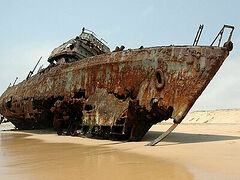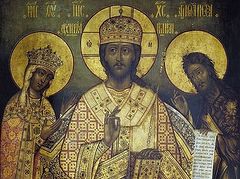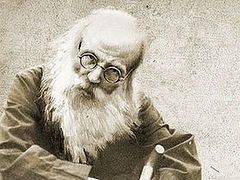How can God allow suffering in the world? What is the correlation between the free will of man and God’s Providence? What are hell and Heaven? These and many similar questions are constantly asked to priests, missionaries and catechists. These are living, burning questions about the relationship between man and God. Well-known apologist of the Russian Orthodox Church Sergei Khudiev reflects on them as part of the “Let’s Talk” project of the Sretensky Monastery educational and catechetical center for adults.
Suffering has two aspects: the logical and the emotional. These need to be distinguished. If someone, like a Biblical personage, suffers emotionally when he sees evil, he needs consolation and not explanations and lectures on theology. But if we are talking about logical objections, it is quite possible to answer them. The root cause of evil is the abuse of free will. God created people so that they would able to make decisions. These decisions affect us and the whole world. When we make wrong decisions, it damages the whole world and our relationships with other people. Evil is not something that exists outside me: I am myself part of the problem. When we turn to God in repentance, we begin to see that we are ourselves part of the problem. And the problem of evil is that of our own abuse of free will. We can begin to solve the problem where it is relatively solvable—in ourselves. That is, evil is a situation in which I have to decide for myself which side I will be on. There is an acute conflict in the world—there is evil and opposition to the will of God, and I decide in this situation (which is unclear to me) what I should do. I don’t know where it fits into God’s plan, but I can decide which side I can be on.
Let us refer to the example of the New Martyrs and Confessors. They faced suffering through their own experience—they were subjected to persecution, torture, severe deprivation, starvation, and eventually were killed. They kept the faith amid pain and suffering. It upsets me very much when I read on the net about atrocities. But I immediately remember the martyrs, and relatively recent ones who were victims of such atrocities and remained faithful to God.
We choose to be faithful to God and keep hope. At the level of logic this is explained by the fact that there is free will. Christianity says that God will turn very bad things into very good ones. We see this in the example of the Crucifixion of the Lord. There are amazing words in the prophecy of Isaiah: He shall see of the travail of His soul, and shall be satisfied (Is. 53:11). If someone has experienced torture, humiliation and suffering, he will not view it with contentment. He will have a very severe PTSD and will need professional help to overcome it. But it was said of Christ that He would look with contentment upon what He would experience.
The suffering that people endured on earth, if they endured it with faith and patience, will turn into something amazingly good on “the Other Side”. The Apostle Paul writes that our temporary suffering is nothing compared to the glory that will be revealed in us (cf. Rom. 8:18). Not only will suffering be forgotten and remain in the past as a “turned page”—it will turn into something extremely good. The Christian faith says that earthly suffering will turn into eternal joy. We do not know how it will be, and it may seem absolutely incredible to us. But how could the Crucifixion turn into everlasting joy? It is difficult to imagine a more terrible thing than crucifixion. And the sufferings of the martyrs also turn into eternal glory and joy. When we pass into eternity, we will see it clearly and say: “Yes, this is exactly how it was supposed to be.” For now we only choose to believe.
But misconceptions should be avoided. The fact that God will turn it into good is not an excuse for evil. When people feel anger and indignation in the face of evil and crime, these are absolutely justified experiences. Another thing is that we must be aware that judgment belongs to God, not to us. We ourselves should not try and take revenge on villains. Sin has no excuse, but God takes evil and makes something good out of it.
I know several people who repented while in prison. I also know people who are former prisoners and now perform prison ministry. They confess that they ended up in jail for a good reason. They committed crimes and were imprisoned for them. Of course, to commit a crime is absolutely bad, and there is nothing good about going to jail. But when a person turns to God, He takes his negative experience and turns it into something good.
The tree of the knowledge of good and evil
This tree was needed in order for man to show his faithfulness to God. In a situation where I cannot sin I cannot show my faithfulness, just as a man on an uninhabited island cannot cheat on his wife or someone who is not in office cannot take bribes. Virtue and fidelity are shown by someone who has the opportunity to cheat on his spouse, take bribes and sin, but he refuses this opportunity on principle. The opportunity to sin was in Paradise so we could make choices and show our worth. We grow as individuals in our relationships with God as we choose to be faithful and patient. Let’s say something irritates us and gets on our nerves. And we decide for the sake of God to show patience and grow in this virtue. If there is nothing to annoy we will not grow in the virtue of patience, just as we will not grow in the virtue of courage when no one frightens us.
Where is God and why doesn’t He help?
God helps us in our trials. First of all, it is important to understand that we are here temporarily and not for long. One day we will all die, and it isn’t terrible. The apostle Paul writes: For we know that if our earthly house of this tabernacle were dissolved, we have a building of God, an house not made with hands, eternal in the heavens (2 Cor. 5:1). It will be very good in Heaven. We are not caught in this situation forever. When a person endures trials and suffering with hope and the desire to fulfill the will of God, this brings great fruit in Eternity. Sometimes difficult moments in life are needed so that we may reorient ourselves to fulfilling God’s will and ask ourselves: “What does God want from me at this moment?” When we face a difficult challenge, we tend to focus on ourselves. We wonder why we feel bad and why everything is not as we want. We suffer from this. When we start thinking about why we feel bad, we will always feel bad. We will always need something in our lives because we are not in Paradise. But when we use this situation to fulfill the will of God, it immediately becomes much easier. We come to realize that we are here for a specific purpose. The author C S Lewis created an image of a Christian as a subversive in an enemy camp, sent with a specific mission. He was not sent there to live comfortably—he has a task.
Whenever I read the Apostle Paul’s decisions “from prison”, I am amazed. He was in jail awaiting his martyrdom. I understand that I would go crazy—firstly, prison itself is oppressive; and secondly, because martyrdom is coming. As for Paul, if he had not specified that he was writing from prison, you would not understand what was really happening to him. He wrote with great joy, he comforted people and took care of them! He had a mission in life—he was sent for a specific purpose. As one of my friends said, he is here (on earth) like on a business trip. When some heavy trials befall us, we will increase the severity and suffer additionally by wondering why we need trials.
Our life is a mission to us from God. However, this does not negate some simple earthly things. Sometimes a problem just needs to be solved. Sometimes a person becomes discouraged because, for example, he cannot find a job. In this case he should seek advice from people. I knew such a person and saw how it depressed him. Not only did he suffer financially, he suffered because he felt worthless and not needed by anyone. He sought the help of a secular psychologist and was advised to give thanks and keep a gratitude journal. At first, he received that advice with indignation. He believed that the world was treating him badly—he was trying to break through closed doors, but was everywhere driven away. But then, reluctantly, he sat down and wrote letters of thanks to everyone he dealt with. He thanked people for giving him time and valuable advice—he found something to thank each of them for. And he began to keep a gratitude journal, noticing all the good things that happened to him during the day, starting to notice even small things. After a while he found a job. His bitterness, anger and deep discontent had been preventing him from interacting with the world properly. When he learned to thank, it became much easier for him to live.
I realize that there are things that cannot be overcome in this way. When a loved one has a fatal illness, it is something more serious. But it happens that someone just needs to change his attitude towards the world from anger, grief and distrust to gratitude. Modern cellphones have apps with gratitude diaries, where you can write what you are grateful for this day before going to bed. It is useful when you write, and not speak. I do this every evening and strongly recommend everyone to keep such diaries—it really helps to rise above things.
Why do innocent people die?
We cannot know why all sufferings are given to us. We will only see it on “the other side”. There is suffering, there is pain in life, and we can multiply this pain for ourselves. I can react to my sorrows with anger, hatred, rebellion and resistance. I can feel impotent rage because everything is not as I wish. And by this I will multiply my suffering. It makes absolutely no sense to do that! When someone experiences pain and sorrow with trust in God’s Providence, he makes himself feel better and does not increase his suffering. We cannot make sure that there is no suffering in our lives. But it is within our power not to worsen the situation. I am in a strait betwixt two, having a desire to depart, and to be with Christ; which is far better (Phil. 1:23), the Apostle Paul says. Believers who died are now with the Lord in Heaven and incomparably better off. If we saw them, we would be happy for them. When we end up in Heaven, we will rejoice and be jubilant. The apostle says: This is the victory that overcometh the world, even our faith (1 Jn. 5:4). In all these tribulations we know that it won’t last. We are aware that all this will end in us being with the Lord in Heaven.
Hell is not created by God, but by people. For example, you cannot make a selfish person who betrays everyone happy in marriage or friendship. Not because it is forbidden to him by an external decree, but because such is the property of his soul and character that he cannot receive this blessing. He is always angry, and in this state of mind it will be impossible to be happy. A villain cannot be granted eternal bliss not only out of justice, but because he is unable to contain it. He carries hell fire within himself. The problem of a sinner is that hell is inside him. And salvation means that someone is reconciled with God and God begins to change him from inside, making a Heavenly creature out of him.
I watched a documentary on the partition of India. When the British left this country in 1946, there began a massacre between Hindus, Muslims and Sikhs. 1.5 million people were slaughtered and about forty million were forced to flee, leaving their homes. In the film an elderly Sikh is interviewed: He sits stroking his saber, boasting that not a single Muslim escaped him alive. When asked if he regrets what he did, he says that he should not regret anything because those “bastards” had massacred half of his people. Imagine that this man dies and ends up on “the Other Side”. How can he enter Paradise? He has such pride and hatred! To enter Paradise he needs to change his views on life and repent. If he does not change, he will bring hell with him wherever he is allowed to go.
The problem is not that God will take good people and put them outside the gate—the problem is that bad people, once inside the gate, will create hell everywhere. Unrepentant sinners carry hell with them. And if you just open the gate, hell will be inside. Then hell will not disappear—but there will be no Paradise. In order for a person to enter Paradise he needs to allow God to change him profoundly. People sometimes imagine God as the source of hell, but this is by no means the case. Hell is what man cultivates in himself and carries with him. This is a problem that can only be solved from within. The possibility of hell exists because a person can be confirmed in evil forever.
We do not know the eternal fate of others. Every human being will be judged according to the light that was available to him. We have the opportunity to join the Orthodox Church and receive Communion—this is very great privilege. As far as other people are concerned, God will not treat anyone unfairly. We need not worry about it. What we must do is serve God Who is good and seeks the salvation of all people.
I don’t know what percentage of mankind will be saved. Christ, when asked if there were really so few who would be saved, did not give any figure or percentage of the total number. He said, Strive to enter in at the strait gate (Lk. 13:24).
You are baptized—now everything in your life is part of God’s plan
But the theme of predestination of specific persons for salvation is in the Apostle Paul’s epistles. He says that you have converted and now belong to the Church, and all events in your life are part of God’s plan for your salvation. It is not something that happens outside God’s control. It’s not you who are trying to impose your sonship on God. You came to believe because God predestined you. The circumstances of your life pushed you to turn to God: the books you came across, the people you talked to, the spiritual cleansings you experienced while listening to classical music, or grace that touched you when you were in church. All this is part of God’s plan.
God took care for our conversion long before we came to believe. God had been pushing us in a certain direction all this time. And the apostle said that this plan of our salvation operates in the life of every Christian. Even when we encounter something deeply discouraging that causes us pain and suffering, we know that it is also part of God’s plan for our salvation. The apostle, addressing the faithful, wrote: Blessed be the God and Father of our Lord Jesus Christ, Who hath blessed us with all spiritual blessings in heavenly places in Christ according as He hath chosen us in Him before the foundation of the world, that we should be holy and without blame before Him in love having predestinated us unto the adoption of children by Jesus Christ to Himself, according to the good pleasure of His will (Eph. 1:3–5).
The fact that we are members of the Church is a manifestation of God’s saving plan, which has existed since the creation of the world and cannot be disrupted. So, we can rely on God Who knows what He is doing. For the apostle Paul this is faith in a kind of predetermination1—something that is extremely joyful and positive. When people are tormented by the thought whether or not they are in the “list” of the predestined, this comes from a misunderstanding the apostle’s words.
What is the correlation between free will and God’s plan? They do not contradict each other. What is free will? It is our ability to make decisions. This means that I am alone responsible for my decisions: neither chemical processes in my brain, nor other people, nor even the Lord. I am the author of my decisions. At the same time, God is omniscient. God knows what decisions of all people, angels, demons and all free creatures of the universe will be in all ages.
But in no way does God force them to make these decisions. And since He knows these decisions, He builds His plan based on His knowledge, and His vision cannot be violated. As I command, so shall it be; as I determine, so shall it happen. Both things are true: that people are free and make their own decisions, and that God’s plan cannot be thwarted.











